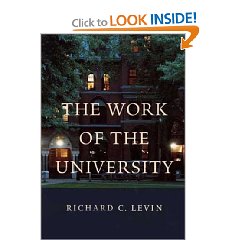The author of the book, “The Work of the University”, is clearly educated, articulate, and well-intentioned. The book shows, throughout, that he is a committed and talented advocate for education as a process that evolves values and the capacity for critical thinking; that he understands the relationship of the University to its alumni, its host city, and the nation at large; and–in an antiseptic sort of way–that China, to take the one example prominent in his book–merits attention, both as a source of students and a host for joint educational ventures.
Early in the book, I thought I was in for a treat when the author, in one of his welcoming speeches to a new class (this is a book of past speeches, not an integrated work) says: “You have the most to learn from those who are least like you; they will challenge you by asking questions you should ask yourself.” The rest of the book helped me understand that these “others” consisted of the Yale faculty and the Yale students, the latter predominantly American but with a full leaving of homogenized wealthy international students all dressed alike in Abercombie & Fitch ensembles.
The book went downhill from there. Although the author makes passing references to overseas problems including genocides, it did not offer me the compelling mission statement I was expecting, of the university as the soul of a nation, the custodian of intellectual values and global awareness, the one place where tenure as well as enlightenment might combine to shed the light of truth on all manner of domestic and foreign policy.
Yale can and should be a “Citizen's Intelligence Network” that trains students to think critically, in the context of very strong moral values, such that a Yale student is by any standard a global thinker and actor. That kind of compelling “pragmatic missionary” perspective is not reflected in this book.
George Will, “Statecraft as Soulcraft,”, Yale Business School Dean Garten on “The Politics of Fortune,” these come closer to “the work of the university” than does this book.





